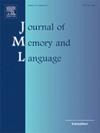Individual differences in prospective and retrospective memory offloading
IF 3
1区 心理学
Q1 LINGUISTICS
引用次数: 0
Abstract
Prior research focused on the relationship between cognitive offloading and working memory ability in the prospective and retrospective memory domains have produced conflicting results. Specifically, past work in the prospective memory domain has found that individuals with lower working memory capacity (WMC) choose to offload more often and benefit more from offloading than those with higher WMC (Ball, Peper, et al., 2022) while work in the retrospective memory domain has not found a relationship between WMC and the use of or benefit from offloading (Morrison & Richmond, 2020). However, task design across studies differed in several other respects aside from memory domain, making it difficult to discern whether different mechanisms underlie cognitive offloading across domains. The current study aimed to address these discrepancies by introducing similar procedures across offloading tasks. Results revealed that when offloading was required or permitted, participants with varying levels of WMC generally performed more similarly to one another than when the task had to be completed using internal memory alone. In addition, participants with lower WMC generally benefitted more from offloading, particularly under high memory load, compared to those with higher WMC when offloading was required and when participants had free choice about whether and when to engage in offloading. However, neither metacognitive underconfidence in internal memory capability nor lower WMC estimates were associated with increased offloading frequency in either memory domain when participants were permitted to offload. Practical and theoretical implications of these findings are discussed.
前瞻性和回顾性记忆卸载的个体差异
以往的研究主要集中在前瞻记忆和回顾记忆领域的认知卸载与工作记忆能力之间的关系,但结果却相互矛盾。具体来说,过去在前瞻性记忆领域的研究发现,工作记忆容量(WMC)较低的个体比工作记忆容量较高的个体更频繁地选择卸载,并且从卸载中获益更多(Ball, Peper等,2022),而在回顾性记忆领域的研究没有发现WMC与使用卸载或从卸载中获益之间的关系(Morrison &;里奇蒙德,2020)。然而,除了记忆领域之外,不同研究的任务设计在其他几个方面存在差异,这使得很难辨别跨领域的认知卸载是否有不同的机制。目前的研究旨在通过在卸载任务中引入类似的程序来解决这些差异。结果显示,当需要或允许卸载时,不同WMC水平的参与者通常比单独使用内存完成任务时表现得更相似。此外,与WMC较高的参与者相比,WMC较低的参与者通常从卸载中获益更多,特别是在高内存负载下,当需要卸载时,参与者可以自由选择是否以及何时进行卸载。然而,当参与者被允许卸载时,内部记忆能力的元认知不自信和较低的WMC估计都与两个记忆域的卸载频率增加无关。讨论了这些发现的实际意义和理论意义。
本文章由计算机程序翻译,如有差异,请以英文原文为准。
求助全文
约1分钟内获得全文
求助全文
来源期刊
CiteScore
8.70
自引率
14.00%
发文量
49
审稿时长
12.7 weeks
期刊介绍:
Articles in the Journal of Memory and Language contribute to the formulation of scientific issues and theories in the areas of memory, language comprehension and production, and cognitive processes. Special emphasis is given to research articles that provide new theoretical insights based on a carefully laid empirical foundation. The journal generally favors articles that provide multiple experiments. In addition, significant theoretical papers without new experimental findings may be published.
The Journal of Memory and Language is a valuable tool for cognitive scientists, including psychologists, linguists, and others interested in memory and learning, language, reading, and speech.
Research Areas include:
• Topics that illuminate aspects of memory or language processing
• Linguistics
• Neuropsychology.

 求助内容:
求助内容: 应助结果提醒方式:
应助结果提醒方式:


